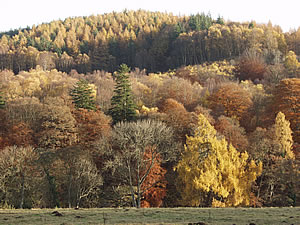 |
|||||||||
|
|||||||||||||||||||
|
|
Grizedale
Farmer Makes History Restoring Cumbria's Ancient Woodland 02/12/05 National Tree Week - 23 November - 4 December
As Britain celebrates the 30th anniversary of National Tree Week, one Cumbrian farmer is making a valuable contribution to the regeneration of the county's woodland - and uncovering some fascinating facts about the region's industrial heritage into the process. Myles Dickenson, of Bark House Bank, Rusland, adjoining Grizedale Forest gave up sheep farming after losing his flock to FMD in 2001. Deciding not to re-stock, Myles worked with adviser Teresa Morris from the Rural Development Service (RDS) to move away from intensive production and explore opportunities to manage his land under the available agri-environment schemes. Myles wanted to regenerate the woodland that had been in his family for several generations, improving the landscape for the benefit of the public and increasing the biodiversity of the area's plants, trees and wildlife. Using a combination of management agreements including Defra's Environmentally Sensitve Areas (ESA) scheme, the Forestry Commission's Woodland Grant Scheme (WGS) and the Lake District National Park's Woodland Challenge Scheme, Myles project was one of the first in the region to successfully integrate farming and forestry. Myles, whose ancestors were timber merchants, working the surrounding woods for over 200 years, collaborated with advisers from the Forestry Commission, and devised a planting scheme to restore 40 hectares of native woodland that had become blanketed with bracken to their former glory. The planting plan takes into account records of the original site, reintroducing native species which have thrived on the site since medieval times, including hazel, blackthorn, alder, ash, juniper, crab apple and bird cherry trees, carefully matched to the land type and feathered into the fell. As Myles began mounding the area for tree planting, he made an amazing discovery, unearthing large amounts of charcoal in shallow pits, between three and four metre diameter. Myles contacted the archaeologists at the Lake District National Parks Authority who surveyed the site and confirmed that they were pits in which charcoal had been produced. Radiocarbon dating has since revealed that the pits are medieval, dating back to around c1350. This discovery has challenged the assumption that charcoal has always been produced on constructed platforms known locally as pitsteads . John Hodgson, Senior Archaeologist at the LDNPA says, "It has always been assumed that charcoal in the Lake District woods has been produced on pitsteads using poles of coppiced wood. "However the charcoal from the Bark House Bank pits was from mature timber with tight ring-growth, meaning it would have been made from woodland that was not coppiced. "We suspected that the pits that had been found dated to the medieval period, so we had the material radiocarbon dated and found that they originated from around c1350. "The charcoal would probably have been used for iron production, a theory supported by the existence of a known Medieval bloomery at the southern end of the site." This is the first time medieval charcoal pits have been recognised in the Lake District, and the information is of major importance for the area's history. LDNPA are now working with Durham University to investigate the pits further. Charcoal samples have also been able to reveal the tree species used, and show that the composition of the ancient woodland was remarkably similar to that being reintroduced today. As well as restoring Bark House Bank to its original grandeur, the scheme will create valuable habitats such as bluebell woods for the benefit of a variety of species. Planting is measured, with 50% new planting, 30% natural regeneration and 20% open space to develop an open woodland canopy. Myles has also established a new four kilometre permissive footpath for the public linking to existing paths within the Rusland Valley and Grizedale forest. Myles Dickenson said: "The scheme at Bark House Bank reflects the general move away from intensive farming towards better land management, which is something I feel strongly about, and is making a valuable contribution to the historical value and biodiversity of the landscape by restoring the woodland to its medieval state. "It has been fascinating to find the charcoal pits and discover the history of the region, and that the species we are planting are the same ones that grew here naturally many years ago. "After the foot and mouth outbreak I felt I had lost everything, but now with the aid of these environmental schemes there is something worthwhile to work towards again. Schemes like this are keeping the valley alive." Teresa Morris, an adviser for the Rural Development Service in the North West, working with Myles Dickinson says: "Rusland and Grizedale Valley's are one of the most beautiful and densely wooded parts of the UK, with a long history of woodland management such as coppicing in the area. This valuable regeneration work that Myles is undertaking is making a significant contribution to maintaining and enhancing the special qualities of the region's landscape. "Myles has significantly increased the conservation value of his farm woodlands through the ESA Scheme which aims to protect and enhance the landscape, wildlife and historic value through encouragement of beneficial livestock farming systems and other land management practices. "Woodlands are very important features of the Lakeland landscape and valuable wildlife habitats. To ensure the survival of these woodlands management the ESA scheme encourages the regeneration of small mixed and broadleaved woodlands and creation of wildlife corridors through appropriate management."
|
||||||||||||||||||

|
|
||||||||||||||||||
| home | agri-services | pedigree
pen | news | dairy | beef | machinery BPS | property | organisations | site map |
|||||||||||||||||||

Department for Environment
Food and Rural Affairs
